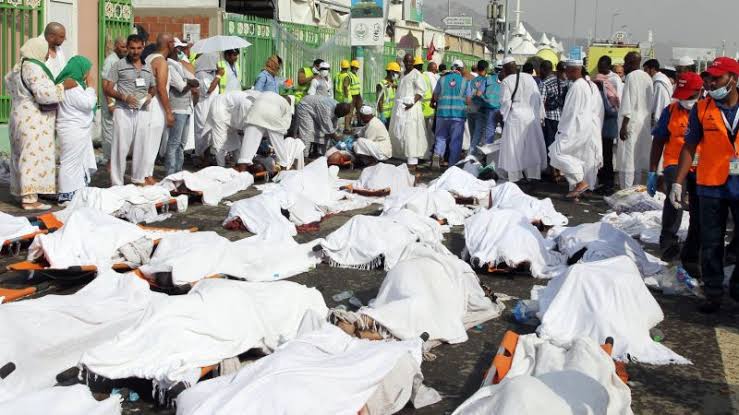Over 1,300 people Died During Hajj pilgrimage in 2024: Saudi Arabia

During the 2024 Hajj pilgrimage, Saudi Arabia reported the deaths of 1,301 people, attributing the majority of these fatalities to heat stress and unauthorized trips. The Saudi government stated that 83 percent of those who died were unauthorized pilgrims who walked long distances under intense sunlight without adequate shelter. Many of the deceased were elderly or chronically ill individuals.
The extreme heat, with temperatures reaching a record 125 degrees Fahrenheit in Mecca, played a significant role in the high death toll. Unauthorized pilgrims, lacking proper transportation and access to water and food, were particularly vulnerable to the harsh conditions. These unauthorized trips complicated the process of identifying the deceased, delaying the official death toll announcement.
Saudi Arabia requires each pilgrim to obtain one of the 1.8 million available licenses to legally participate in the Hajj. These licenses, costing several thousand US dollars, ensure that pilgrims travel in organized tours with necessary amenities. However, many pilgrims, unable to afford the official licenses, undertook the pilgrimage illegally, leading to hazardous journeys.
The Saudi government emphasized that identification of the deceased was completed despite the lack of personal identification documents for many. Proper processes were followed for identification, burial, and honoring the deceased, with death certificates provided to families. The delays in issuing the death toll were partly due to these complexities.
Criticism has been directed at the poor infrastructure and organization of this year’s Hajj. Even officially sanctioned pilgrims faced hardships, spending much of their time walking in the scorching heat. Witnesses reported seeing worshippers losing consciousness and encountering bodies covered in white cloth, underscoring the severity of the situation.
In response to the tragedy, the Egyptian government pledged to revoke the licenses of 16 Hajj tourism firms involved in organizing illegal pilgrimages. These firms are accused of issuing incorrect visas and forcing pilgrims to enter Mecca through hazardous desert paths. The Egyptian Prime Minister, Mostafa Madbouly, extended condolences to the families of the deceased and promised necessary support.
The allocation of Hajj permits is based on a quota system, with Saudi Arabia strictly regulating the number of pilgrims to ensure safety and order. The high cost of these permits drives many to attempt illegal access, often resulting in dangerous and unsupervised journeys. The timing of this year’s pilgrimage, determined by the Islamic lunar calendar, coincided with extreme summer temperatures, exacerbating the situation.
Hajj rituals involve extensive walking and physical exertion in and around Mecca, which can be perilous under such extreme heat. The combination of harsh weather, inadequate preparation, and unauthorized travel significantly contributed to the tragic loss of life. The ongoing investigations may reveal an even higher death toll as authorities continue to account for all pilgrims.
The tragedy has highlighted the critical importance of adhering to legal protocols and ensuring adequate support and infrastructure for the Hajj pilgrimage. As governments and authorities review this year’s events, there will likely be increased efforts to prevent such a catastrophe in the future, emphasizing the need for better organization, enforcement of regulations, and improved facilities for pilgrims.
The 2024 Hajj pilgrimage serves as a somber reminder of the challenges faced by millions of Muslims undertaking this significant religious journey. Ensuring the safety and well-being of all pilgrims, especially under extreme conditions, remains a paramount concern for Saudi Arabia and the global Muslim community.





